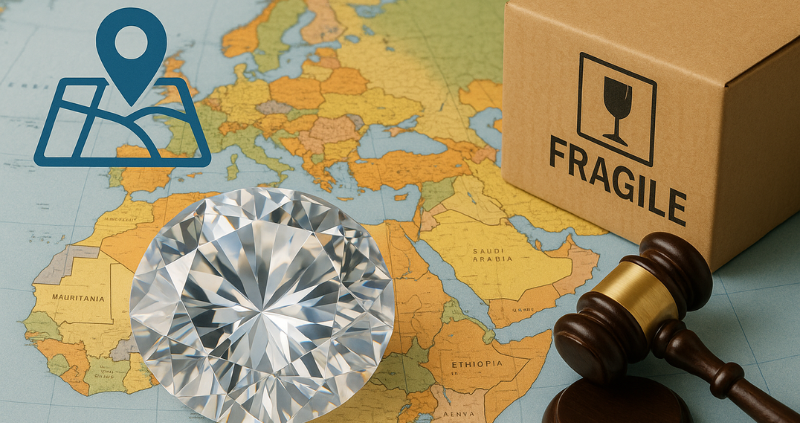Global Diamond Shipping Laws You Need to Know in 2025

Shipping diamonds may sound glamorous, but one wrong document or undeclared detail can lead to delays, fines, or even confiscation. With stricter controls in place for 2025, every trader ,big or small, needs to stay sharp on the legal essentials of global diamond shipping.
1. The Kimberley Process: Still the Starting Point
For rough diamonds, compliance with the Kimberley Process Certification Scheme (KPCS) is non-negotiable. This global initiative ensures that conflict diamonds stay out of the legitimate market.
What’s new in 2025?
- Some countries are piloting digital KP certificates, replacing traditional paper versions in many countries.
- Tighter port inspections in Europe, Africa, and North America mean delays for incomplete or mismatched paperwork.
Always verify your supplier’s compliance and ensure your documentation is watertight before export.
2. Don’t Underestimate the Paperwork
Even for polished diamonds, proper documentation is the backbone of a legal, efficient shipment. Here's a universal checklist:
- Commercial Invoice (with HS Code for diamonds)
- Certificate of Origin
- Packing List
- Lab Certifications (GIA, IGI, etc.)
- Insurance Certificate
- Customs Declaration Forms
In many countries, pre-shipment electronic submission is now mandatory. Skipping this step? Expect delays or penalties.
3. Know the Rules — Country by Country
Different regions = different rules. Here are key highlights for major markets in 2025:
🇺🇸 United States
- Enforces strict origin transparency and HS code declarations.
- CBP uses automated systems to flag under-declared or misclassified shipments.
- Importers may be required to present supporting supplier records.
🇪🇺 European Union
- Requires an EORI number for customs processing.
- Lab-grown and natural diamonds must be declared separately.
- Customs authorities are increasing inspections for high-value jewellery shipments.
🇮🇳 India
- Diamonds must be shipped through authorised zones like the Bharat Diamond Bourse or SEZs.
- GST claims and customs clearance now require full digital traceability.
- Re-import and consignment rules are being updated frequently.
🇦🇪 UAE
- A major re-export hub with strong anti-money laundering regulations.
- Dubai Customs requires exact matches between declared invoice value and insurance documents.
- Misdeclaration penalties have increased significantly in 2025.
4. Secure Shipping Is Not Optional
Beyond legality, diamonds need to be shipped with security and discretion in mind. Best practices include:
- Unmarked, tamper-evident packaging
- Double-boxing system with no external branding
- Trusted logistics partners (Brinks, Malca-Amit, Ferrari Group, etc.)
- End-to-end tracking with real-time updates
- Full-value insurance coverage
Some couriers now use blockchain-enabled tracking for ultra-secure shipments — a growing trend worth considering.
5. The Lab-Grown Factor: Declare It Clearly
In 2025, customs laws in many countries require explicit separation of lab-grown and natural diamonds in all shipment-related documents.
What to include:
- The term “Laboratory-Grown” or “Synthetic” must be clearly written on the invoice and customs forms.
- Mention the growth process (CVD or HPHT) if available.
- Attach matching lab certificates to prevent delays or confusion at customs.
Failure to properly declare lab-grown stones can result in seizure, blacklisting, or loss of export privileges — especially in markets like the US and EU.
6. Stay Alert: Regulations Are Changing Fast
Global diamond trading is under a microscope in 2025 due to growing concerns over:
- Ethical sourcing
- Tax compliance
- Anti-money laundering
Governments and trade bodies are updating policies more frequently than ever. Traders must stay subscribed to trade bulletins, customs notifications, and official updates from export councils and gemological associations.
Final Thoughts: Smart Traders Ship Smart
Shipping diamonds across borders isn’t just about putting stones in a box — it’s about compliance, documentation, timing, and trust. With so many new laws and tech tools emerging in 2025, the only way to stay ahead is to stay informed.
Whether you're a solo exporter or managing large volumes, make global compliance your best habit not an afterthought.

